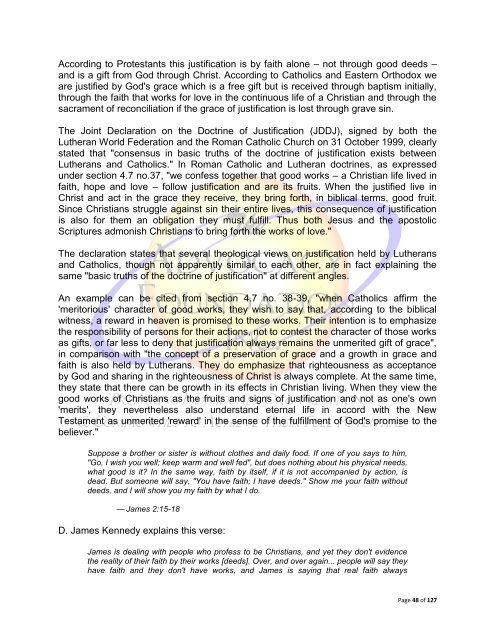Acquiesce to Righteousness
Acquiesce to Righteousness
Acquiesce to Righteousness
Create successful ePaper yourself
Turn your PDF publications into a flip-book with our unique Google optimized e-Paper software.
According <strong>to</strong> Protestants this justification is by faith alone – not through good deeds –<br />
and is a gift from God through Christ. According <strong>to</strong> Catholics and Eastern Orthodox we<br />
are justified by God's grace which is a free gift but is received through baptism initially,<br />
through the faith that works for love in the continuous life of a Christian and through the<br />
sacrament of reconciliation if the grace of justification is lost through grave sin.<br />
The Joint Declaration on the Doctrine of Justification (JDDJ), signed by both the<br />
Lutheran World Federation and the Roman Catholic Church on 31 Oc<strong>to</strong>ber 1999, clearly<br />
stated that "consensus in basic truths of the doctrine of justification exists between<br />
Lutherans and Catholics." In Roman Catholic and Lutheran doctrines, as expressed<br />
under section 4.7 no.37, "we confess <strong>to</strong>gether that good works – a Christian life lived in<br />
faith, hope and love – follow justification and are its fruits. When the justified live in<br />
Christ and act in the grace they receive, they bring forth, in biblical terms, good fruit.<br />
Since Christians struggle against sin their entire lives, this consequence of justification<br />
is also for them an obligation they must fulfill. Thus both Jesus and the apos<strong>to</strong>lic<br />
Scriptures admonish Christians <strong>to</strong> bring forth the works of love."<br />
The declaration states that several theological views on justification held by Lutherans<br />
and Catholics, though not apparently similar <strong>to</strong> each other, are in fact explaining the<br />
same "basic truths of the doctrine of justification" at different angles.<br />
An example can be cited from section 4.7 no. 38-39, "when Catholics affirm the<br />
'meri<strong>to</strong>rious' character of good works, they wish <strong>to</strong> say that, according <strong>to</strong> the biblical<br />
witness, a reward in heaven is promised <strong>to</strong> these works. Their intention is <strong>to</strong> emphasize<br />
the responsibility of persons for their actions, not <strong>to</strong> contest the character of those works<br />
as gifts, or far less <strong>to</strong> deny that justification always remains the unmerited gift of grace",<br />
in comparison with "the concept of a preservation of grace and a growth in grace and<br />
faith is also held by Lutherans. They do emphasize that righteousness as acceptance<br />
by God and sharing in the righteousness of Christ is always complete. At the same time,<br />
they state that there can be growth in its effects in Christian living. When they view the<br />
good works of Christians as the fruits and signs of justification and not as one's own<br />
'merits', they nevertheless also understand eternal life in accord with the New<br />
Testament as unmerited 'reward' in the sense of the fulfillment of God's promise <strong>to</strong> the<br />
believer."<br />
Suppose a brother or sister is without clothes and daily food. If one of you says <strong>to</strong> him,<br />
"Go, I wish you well; keep warm and well fed", but does nothing about his physical needs,<br />
what good is it? In the same way, faith by itself, if it is not accompanied by action, is<br />
dead. But someone will say, "You have faith; I have deeds." Show me your faith without<br />
deeds, and I will show you my faith by what I do.<br />
— James 2:15-18<br />
D. James Kennedy explains this verse:<br />
James is dealing with people who profess <strong>to</strong> be Christians, and yet they don't evidence<br />
the reality of their faith by their works [deeds]. Over, and over again... people will say they<br />
have faith and they don't have works, and James is saying that real faith always<br />
Page 48 of 127

















